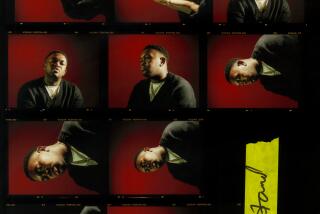Who’s the real ‘idol’?
- Share via
As Ruben Studdard brought his first headlining tour Thursday to the Pantages Theatre, it was quickly evident he’s not an American Idol.
No, as the promotional materials and his introduction by his bassist stressed, the champion from the hit TV show’s second season is “our American Idol.”
Studdard’s fans exhibit a profound sense of ownership in his career, not simply because their votes last spring helped transform him from a likable but struggling singer from Alabama into a hit recording artist. More than fellow “AI” successes Kelly Clarkson or Clay Aiken, Studdard comes across the most like one of us, a voice in the crowd that’s been happily singled out by the fickle finger of fame.
Studdard’s show wisely exploits his regular-guy appeal. He strolled onto the stage dressed not in the GQ duds of his hero and role model, Luther Vandross, nor in the de rigueur athletic gear of his rap and hip-hop contemporaries, but in faded blue jeans (like all the members of his band), white running shoes and a loose-fitting powder blue oxford shirt.
He repeatedly flashed an endearing “Gee, am I really here?” expression of wonder that is a key part of his easygoing charisma.
The romantic R&B; balladeer niche is anything but overcrowded these days, especially since its reigning master, Vandross, was sidelined by a stroke last year. Studdard is well aware that the smoldering ballad is his key to success, more than the hip-hop lite workouts on his hit debut album, “Soulful.”
“We have a mission,” the 25-year-old singer said early in the set. “Something that’s been missing for a very long time.... The slow dance.”
As an entertainer, Studdard is pretty green. He often stood at the microphone not knowing what to do with himself, and sometimes simply rocked from side to side as he sang. “American Idol” may give contestants the experience of performing, but it can’t bestow performing experience.
One reason “AI” continues to be so successful, however, is that it weds two cornerstones of the American character: the notion that anyone can rise to the top and the fervent hope that “this won’t take long, right?”
So Studdard, Clarkson and Aiken are lifted from obscurity, not from years of dues paying, but via instant careers handed them on a platinum platter after a few short weeks on national TV.
That isn’t to say Studdard isn’t worthy of the adulation now being heaped on him. For a little more than an hour on stage, this gentle giant capitalized on his unlikely sex appeal, eliciting shrieks from the predominantly female fans both with his teddy bear cuddliness and, yes, his soulful singing.
His album’s strength is the ultra slow-burn ballads, where his glassy voice lets loose with melismatic freedom. He’s sufficiently accomplished to be taken seriously as a disciple of Vandross and Teddy Pendergrass, whose respective renditions of “Superstar” and “How Can You Mend a Broken Heart” are the models for his own treatments, rather than the Leon Russell and Bee Gees originals.
On the album there’s lots of space for his voice, something he didn’t get often enough Thursday, when the band’s arrangements frequently smothered the star.
The one time the show truly jumped to life was when he launched into a full-fledged gospel rave-up treatment of the CD’s self-referential “No Ruben.”
With the five-piece band, three-piece horn section and three singers blazing as if they were winding up a Sunday morning church service, Studdard demonstrated where the source of his soulfulness really lies. His physical movements were still minimal, but the spiritual electricity coursing through his mighty frame was palpable throughout the packed room.
Somebody ought to get this man a pulpit.
More to Read
The biggest entertainment stories
Get our big stories about Hollywood, film, television, music, arts, culture and more right in your inbox as soon as they publish.
You may occasionally receive promotional content from the Los Angeles Times.









